First of all, you are not alone. The first thing you need to do, if you have a diagnosis for a serious life threatening allergy is to arm yourself with all the information you can. Get the best help, get tests done, see a specialist. Easier said than done I know, but don’t give up, if you are not happy with the advice you’ve been given keep on searching.
Find out exactly what you need to know to stay safe. Understand it’s OK to feel like this. It’s alright to feel fear, anxiety and anger. Helplessness, hopelessness and a total lost of control. But you get one chance at this life. Don’t let the fear consume you. Right now I’m not the best advert for that myself but I’m working my through the emotional assault. Don’t suffer in silence.
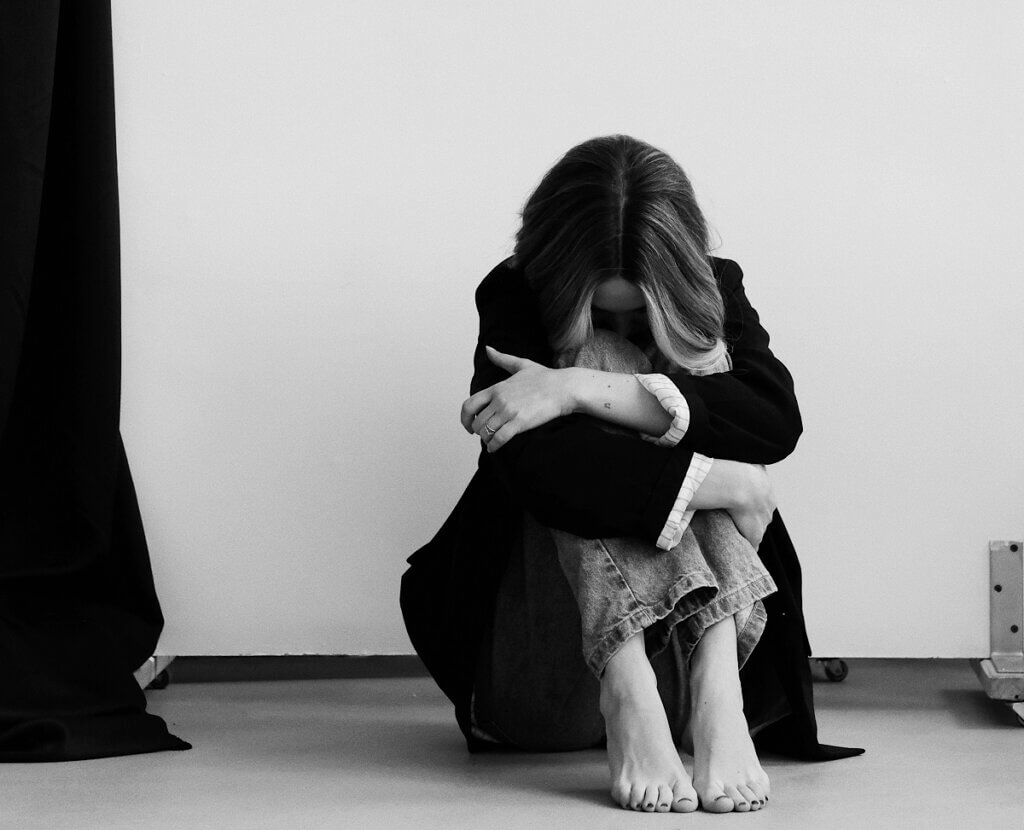
Here are my tips, the things that have helped me.
- Speak to people – Tell your friends and family. Do you know anyone with a similar medical condition? I have found recent allergy focused events, including The Anaphylaxis Campaign Conference and Food Matters Live encouraged me to share and talk to my fellow bloggers, parents of allergic kids and people in the allergy community. It was tough at times and I didn’t hold it together as much as I’d hoped but I came away from both events knowing that it had helps, I was making progress just by sharing.
- Contact professional organisations – I have also spoken to Allergy UK and The Anaphylaxis Campaign who both have free helplines which you can phone and also loads of advice and resources. They also have local support groups so you may find one local to you which will help you to attend. The Anaphylaxis Campaign also offer one free referral to a counsellor but do be aware, she is busy. I wasn’t able to get an appointment until 2018 but it’s worth considering as it could help you.
- Writing about it – this might not work for everyone, but as a writer and blogger, writing about my recent experience, how it makes me feel and how I plan to use these emotions positively is really helping me. I appreciate that it might not work for others but don’t knock it till you’ve tried it. So basically guys, you are my therapy. Whether you like it or not, this blog will be following my journey dealing with this. It’s already helping. And it’s already tough. Bottling it up, my earlier preferred coping mechanism wasn’t working and ultimately you have to deal with emotions and move forward.
- Update your Action Plan – One thing I realised after my recent allergic reaction was that my Allergy Action Plan needs updating. It has literally disintegrated with overuse. Having a strict plan and protocol in place can really help you and those who may need to care for you if you have a reaction know what to do. If you don’t have one, write one!
- Anger management – Feeling angry isn’t an emotion I’m used to dealing with. I’m far less tolerant and quick to rise, where before I rarely felt anger. It’s almost like a rage building in me and I have grown very intolerant of people. Apologies if you’ve been on the other end of my anger. I don’t like feeling like this and I am working on taming it. This book, if you can ignore the Christian references is very helpful. It is written by a Christian but deal with anger in a very sensible way. It’s a natural emotion and actually quite healthy. Don’t beat yourself up (as well as snapping at others… lol) Try reading ‘Taming a Powerful Emotion’ by Gary Chapman
- Cognitive behavioural therapy (CBT)– If you think counselling might help you to deal with fear and anxiety then CBT is probably the most useful kind of treatment available. There are loads of organisations who can help, from the NHS, Mind and private counsellors. Research what’s available and find a solution that works for you.
- Health Minds referral scheme – you can self refer yourself for counselling using the NHS Healthy Minds Self Referral scheme. I have already had the initial assessment and have my first session scheduled for next week. I already feel calmer after just having organised this. The first assessment was gruelling enough and I know this will be tough, but I really think it will help me to talk about how I feel with a neutral person, someone who does not know me and is qualified to help me work through this and find ways of coping with how I’m feeling. This is the most convenient solution for me at the moment because they arrange a phone call with you on a weekly basis at a time convenient to you, which is easier to fit into my life at the moment.
- I am, I am, I am by Maggie O’Farrell – this book is beautifully written and covers Maggie’s memoirs; seventeen brushes with death. This may sound macabre and something you definitely shouldn’t be reading when faced with your own near death experiences, but I challenge you. You will finish reading this feeling newly conscious, and determined to make every heart beat count. The final chapter recounts an experience when Maggie’s own daughter has an anaphylactic attack and has to be rushed to hospital. Read this book, if you have allergies or are a mother of allergic kids – I am, I am, I am, by Maggie O’Farrell – it will help you.
- Run, Run, Run – Again this might not be for everyone but the sentiment is the same. Find something that you can do that completely takes you out of how you’re feeling. Something that clears your mind. This is running for me. I’m running my brain back to normal. Well maybe not normal, but back to stable. This could be something creative, fundraising, volunteer for a local charity. Anything that gives you new perspective. The latter being something I may look into when I can find more time. Giving something back can really help you feel your worth in society, because you are worth so much.
- Wear your Medicalert bracelet – This is really important. In my recent allergic reaction I was unconscious and couldn’t tell anyone what had happened. I had been wearing my Medicalert bracelet but when the reaction took place, that morning I had slipped it into my purse because it was irritating the eczema on my wrist. No one knew this and I was told that the paramedics were searching or one. It has made my realise I need to have more than one option of how to wear mine. I have a necklace too but need to find something softer for when my skin is sensitive. Writing this I realise I have not resolved this one yet!
I hope this helps in some way because I know how isolating and heartbreaking it can be when it feels like your body is against you.
It’s not an exhaustive list and I may add to it as I think of other things.
But as you can see, there are so many practical steps you take to help you cope.
One thing I am doing a lot of is sleeping.
Emotions are exhausting.
Be kind to yourself. Let your mind and body heal.
Anaphylaxis – The Ultimate Guide
If you are struggling with anxiety about living with the threat of anaphylaxis and life threatening allergies, you might be interested in ‘Anaphylaxis: The Essential Guide: An Action Plan For Living With Life-Threatening Allergies’.
Anaphylaxis has the potential to hijack your everyday life but it is possible to create a positive path forward.
Anaphylaxis can be terrifying. It can make people severely ill and in rare cases it can be fatal. Symptoms can include difficulty breathing and swallowing, rashes, vomiting, collapse and loss of consciousness. Every person’s allergic reaction is different and the symptoms can also be different depending on which allergen they come into contact with. They might only suffer a mild reaction at first, but the reactions may become severe over time.
Ruth Holroyd, who is severely allergic to nuts, dairy and other foods, has a lifetime of experience of anaphylaxis. Through research and her first-hand experience she has compiled a self-help guide for people living with the condition, their family and their friends.
In Anaphylaxis: The Essential Guide, you will discover information, help and support to face this frightening condition with confidence. Ruth shows you how to:
- Get a diagnosis swiftly and how to come to terms with it
- Recognise the other factors that can affect the severity of a reaction, including exercise and medication
- Put together an Anaphylaxis Action Plan with day-to-day tips and strategies for staying safe at home and at work, eating out, holidays and dating
- Assess possible treatments, therapies and resources
- Cope with the psychological impact of living with anaphylaxis and severe allergies
- Take action when you’re feeling depressed or anxious, or experiencing panic attacks
- Create a positive and resilient mindset, and reframe the condition to feel less excluded and more in control
To find out more about this book, read reviews and even watch a video review visit, Anaphylaxis: The Ultimate Guide here.
Stay safe allergy warriors.
Be prepared, never take risks and always, always carry your adrenaline injectors #takethekit
I will leave you with this video. If you know someone with anaphylaxis who does not carry their adrenaline, or even worse, has not been prescribed any, ask them to watch this short but very moving video
NB: If you feel really depressed or have any thoughts that make you really scared, don’t know what to do and just need to speak to someone any time of day, call the Samaritans 116 123 from any phone any time of day or night. Someone will speak to you and just the act of talking could help.









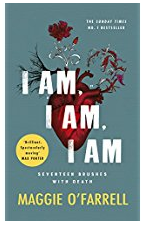
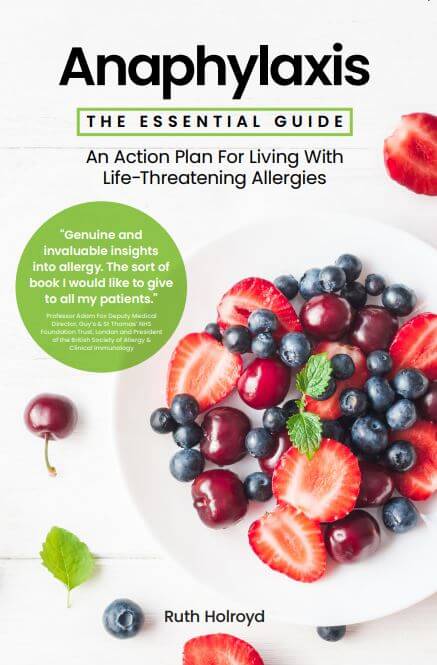
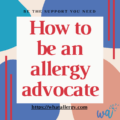
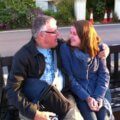
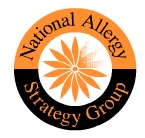
Thank you. I was crying, unable to sleep when it came home to me that my little granddaughter, just a little over 25 months, has to live knowing she can’t have chocolates, chicken, peas, eggs, peanuts, cashews—most of these could be fatal. Now her parents and us widowed grandmothers are upset, but yes, we will soldier on and with God’s grace and blessing and support of people like yourselves–we will see she remains the lively, darling and carefree angel that she is, She goes to Kids Allowed once a week and loves it there–she’s already bowled over the staff with her naughty, sweet charm.
Thank you again, I felt much better reading your blog.
Mrs S thank you so much for your comment. And it is so lovely to hear from such a caring family. Your granddaughter will no doubt grow to learn how to live with her dietary restrictions. it’s not easy, especially when they can life threatening but I have to hold on to the fact that is very rare to have a very serious reaction… most are mild and with all our careful planning and controls in place hopefully we can avoid many many mistakes. Give her an allergy free cuddle from me. I can’t eat peanuts or cashews either but also have to avoid all dairy, soya, wheat, all nuts and to a lesser degree celery and tomatoes, kidney beans, broad beans and lactic acid. I’m doing fine though, after a fashion and when the wind blows in the right direction. Keep smiling
Ruth, I have no life-threatening allergies, but this has been so helpful with bipolar and anxiety. Thanks!
Hi Susan, thanks so much for the comment. And I’m so glad these tips helped you. It’s taken me years (too many years) to work out what the feelings I had were, the anxiety was just bubbling away and building until I had to really address them. They affect all areas of my life and the things I learnt help with so much more than just, will I make a mistake with my allergies. I wish we were all taught this stuff earlier in our lives. I’ve found another wonderful calming activity, I took a jigsaw puzzle away on a solo holiday and I found it so incredibly relaxing and I just got right into the zone. It was a kind of magic, how my brain began to find pieces before I thought I had, and I was sad when it was done! Definitely going to find a way to do these more in my tiny flat! Anyway thanks again for your lovely comment. And I wish you all the best, Bipolar must be a challenge to understand and navigate. In my experience some of the most interesting people are those who find ways to overcome (wrong word) live with these complex mental conditions. Until we find the buttons to choose and turn off unhelpful thought patterns it’s only hard work that helps.